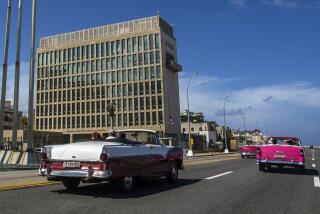Dissecting a Medical Mystery : Federal panel will seek causes of symptoms suffered by thousands of Gulf War veterans
- Share via
Nearly four years after the end of the Persian Gulf War, Pentagon doctors still are unable to identify the sources of the ailments that affect thousands of that conflict’s veterans. More than 500,000 Americans served in the gulf area and more than 40,000 reported apparent service-connected health problems. About 16% of these remain undiagnosed.
Dr. Steven Joseph, assistant secretary of defense for health affairs, has told a House veterans’ affairs subcommittee that early tests indicate chemical and biological agents were not involved in the mysterious maladies. But the Pentagon also says the possibility of exposure hasn’t been foreclosed. Meanwhile, what has come to be known as Gulf War syndrome continues to produce fatigue, headaches, muscle pain and sleep disturbances in its sufferers.
Dissatisfaction with the way the government has tried to find answers to the veterans’ health problems has now prompted President Clinton to announce the creation of an independent panel to help seek proper diagnoses and treatment.
The White House promises that participants will include distinguished scientists, doctors, veterans and other private citizens. Besides whatever expertise the committee might bring to the problem, it should also serve to lend credibility to the investigative effort. Some knowledgeable scientists have complained that effort is badly organized. Other critics have inevitably gone further, suggesting a deliberate government attempt to cover up potentially embarrassing findings.
The big problem in making diagnoses may stem simply from the Gulf War veterans’ exposure to such a variety of environmental hazards. These included pesticides, insects, the wide use of antitank ammunition made from depleted uranium and, of course, the toxins produced by the hundreds of oil wells the retreating Iraqi army set afire. Additionally, those stationed in the gulf area were inoculated with largely untested antitoxins meant to protect against possible Iraqi chemical weapons. Any, all or none of these might have produced the reported symptoms.
New insights could come when research is completed later this year comparing the health of Gulf War veterans with that of soldiers who were stationed elsewhere at the time. What’s known for now is that other members of the anti-Iraq coalition in the gulf do not seem to have suffered from unusual health problems. That only adds to a mystery whose unraveling is something the country clearly owes its Gulf War veterans.






